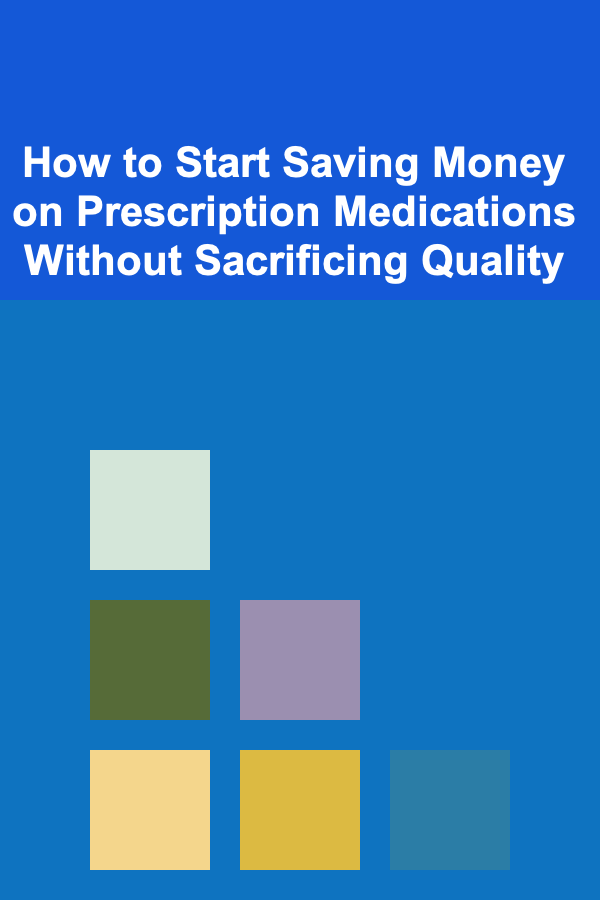
How to Start Saving Money on Prescription Medications Without Sacrificing Quality
ebook include PDF & Audio bundle (Micro Guide)
$12.99$10.99
Limited Time Offer! Order within the next:

Prescription medications are a crucial part of maintaining health, but the cost can quickly become a significant burden. With rising healthcare expenses, many individuals are looking for ways to save on their medications without compromising on their quality or effectiveness. Fortunately, there are several strategies you can employ to lower your prescription medication costs while still receiving the high-quality treatment you need.
In this actionable guide, we'll explore how you can start saving money on prescription medications, providing you with practical tips and tools to reduce costs, avoid overpaying, and make informed decisions about your healthcare.
Understand Your Insurance Plan and Coverage
The first step in saving money on prescription medications is to fully understand your insurance plan and what it covers. Many people are unaware of the specific details regarding their insurance benefits and may end up paying more for medications than necessary.
Actionable Steps:
- Review Your Plan: Take the time to review your insurance policy and prescription drug coverage. Some plans have a formulary, which is a list of medications covered at different tiers with varying costs.
- Check for Preferred Pharmacies: Some insurance plans partner with specific pharmacy networks to offer lower prices. If your insurance provides a list of preferred pharmacies, make sure to use them to get the best rates.
- Evaluate Tiered Pricing: Medications on lower tiers typically cost less, so if your medication is available in generic form or a preferred brand, choose those options to save money.
- Ask About Mail-Order Pharmacy Options: Many insurers offer mail-order pharmacy services, which can reduce costs for long-term medications.
Risk Factors:
- Unaware of Coverage Limits: Many people don't realize that their insurance may not cover all medications, or that there are limits to coverage.
- Unexpected Out-of-Pocket Costs: Even with insurance, some medications may have high out-of-pocket costs due to deductibles, co-pays, or not being on the formulary.
Consider Generic Medications
One of the most effective ways to reduce prescription drug costs without sacrificing quality is by opting for generic medications. Generic drugs contain the same active ingredients as their brand-name counterparts and are required by the FDA to meet the same quality and safety standards.
Actionable Steps:
- Ask Your Doctor About Generics: Whenever a prescription is written for a brand-name medication, ask your doctor or pharmacist if there's a generic equivalent available. They can help you find alternatives that are equally effective but cost significantly less.
- Check for Generic Availability: Many medications that were once patented are now available as generics. The savings can be substantial, sometimes as much as 80% compared to the brand-name version.
- Research Availability at Multiple Pharmacies: Different pharmacies may offer different prices for generic drugs, so it's worth comparing prices before making a purchase.
Risk Factors:
- Inconsistent Availability: Some generic medications may not be available for all drugs, especially newer ones or those with specific formulations.
- Quality Concerns: While generics are FDA-approved, some people may have concerns about their effectiveness. However, generics undergo rigorous testing to ensure they meet the same standards as branded medications.
Use Discount Programs and Coupons
Pharmaceutical companies, pharmacies, and third-party organizations often offer discounts, coupons, and assistance programs to help reduce the costs of prescription medications. These programs can significantly lower your out-of-pocket expenses.
Actionable Steps:
- Pharmacy Discount Cards: Many pharmacies offer free discount cards or memberships that can reduce the price of medications. These cards may be available online or at the pharmacy itself.
- Manufacturer Assistance Programs: Pharmaceutical manufacturers may offer savings programs for patients who meet certain criteria, such as income thresholds or insurance requirements. Check the manufacturer's website for more information on these programs.
- Third-Party Coupon Websites: Websites like GoodRx, NeedyMeds, or RxSaver provide coupons that can help you save money on prescriptions at local pharmacies or online pharmacies. Simply search for your medication and compare prices.
- Use Pharmacy Benefit Managers (PBMs): Some PBMs offer discounts on medications or provide a platform for comparing prices across pharmacies, ensuring you get the best deal.
Risk Factors:
- Eligibility Requirements: Some discount programs or coupons may have restrictions based on your income, insurance status, or the medication prescribed.
- Not All Medications Covered: Not all medications may be available through discount programs, particularly newer or specialty drugs.
Buy in Bulk for Long-Term Medications
If you have a chronic condition and need to take medication on a long-term basis, buying in bulk can be an effective way to save money. Many pharmacies and insurance plans offer discounted rates for longer prescriptions, which can reduce the overall cost of your medication.
Actionable Steps:
- Request a 90-Day Supply: If you're taking a medication that you need on a long-term basis, ask your doctor and pharmacy about switching to a 90-day supply rather than a 30-day supply. This often results in lower monthly costs.
- Check Your Insurance's Mail-Order Option: Many insurance plans offer discounts for long-term medications when purchased through their mail-order pharmacy, making this an option to consider for ongoing prescriptions.
- Evaluate Wholesale Pharmacies: Some online or wholesale pharmacies may offer discounts when purchasing in bulk, especially for medications that don't have a short shelf life.
Risk Factors:
- Upfront Cost: Buying in bulk requires a larger upfront payment, which may be difficult for some patients to manage, even though it can lead to long-term savings.
- Changing Prescription: If your medication needs change, having a large supply on hand may result in wasted medication if you need to switch to a different treatment.
Take Advantage of Online Pharmacies
Online pharmacies can often offer more competitive prices on medications than brick-and-mortar stores due to lower overhead costs. While you should always ensure that the online pharmacy is legitimate, using a reputable online source can lead to significant savings.
Actionable Steps:
- Check for Accreditation: Ensure the online pharmacy is licensed and accredited. Look for the National Association of Boards of Pharmacy (NABP) seal or a similar accreditation to ensure legitimacy.
- Compare Prices: Use price comparison websites to find the best prices for your medication online. You might find significant savings compared to traditional pharmacies.
- Avoid Fraudulent Pharmacies: Be cautious of websites offering "too good to be true" deals or unapproved medications. Stick to reputable online pharmacies and always verify their credentials.
Risk Factors:
- Legitimacy Concerns: Some online pharmacies may sell counterfeit or expired medications, so it's crucial to use trusted sources.
- Shipping Delays: Purchasing medications online may result in delayed shipping, which could be problematic if you need the medication urgently.
Talk to Your Doctor About Alternative Treatments
Sometimes, the prescribed medication may not be the only or the most affordable solution. It's worth discussing alternative treatments with your healthcare provider, including lower-cost medications or different therapies.
Actionable Steps:
- Discuss Generic Alternatives: Ask your doctor if there are lower-cost alternatives to the prescribed drug, including over-the-counter options or therapies that can provide similar results.
- Explore Lifestyle Changes: Depending on your condition, your doctor may recommend lifestyle changes (such as diet or exercise) that can help reduce or eliminate the need for certain medications.
- Investigate Compounding Pharmacies: In some cases, a compounding pharmacy can create a custom medication that is less expensive or better suited to your needs.
Risk Factors:
- Effectiveness: Not all alternative treatments may work as effectively as the prescribed medication, and some could have side effects or risks.
- Insurance Coverage: Some alternative treatments might not be covered by insurance, or they might be more expensive than generics.
Conclusion
Saving money on prescription medications without sacrificing quality is entirely possible with the right strategies. By understanding your insurance coverage, considering generics, using discounts, buying in bulk, exploring online pharmacies, and discussing alternatives with your doctor, you can significantly reduce your medication expenses while maintaining your health and well-being.
The key is to be proactive, ask the right questions, and stay informed about the many options available to help manage your healthcare costs effectively. Start with these actionable steps, and you'll soon see a reduction in your prescription drug expenses, all while receiving the high-quality care you deserve.

How to Make Money Online as a Content Strategist: 10 Actionable Ideas
Read More
How to Master Coffee Cupping and Tasting
Read More
How to Organize a Family Movie Marathon at Home
Read More
How to Set Up a Multi-Functional Fitness Area
Read More
How to Store Hobby Materials Safely and Securely
Read More
How to Tackle Your Home's Most Overlooked Cleaning Areas
Read MoreOther Products

How to Make Money Online as a Content Strategist: 10 Actionable Ideas
Read More
How to Master Coffee Cupping and Tasting
Read More
How to Organize a Family Movie Marathon at Home
Read More
How to Set Up a Multi-Functional Fitness Area
Read More
How to Store Hobby Materials Safely and Securely
Read More